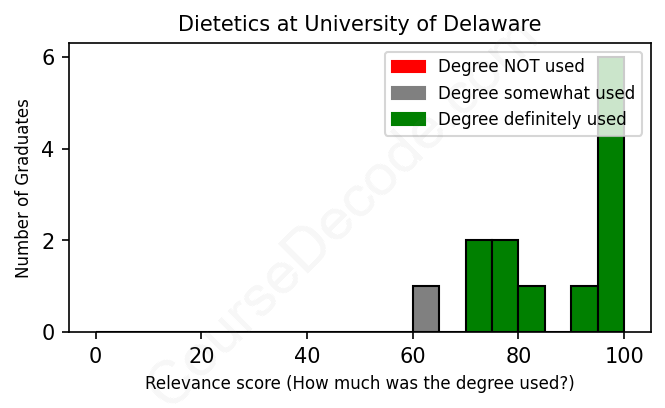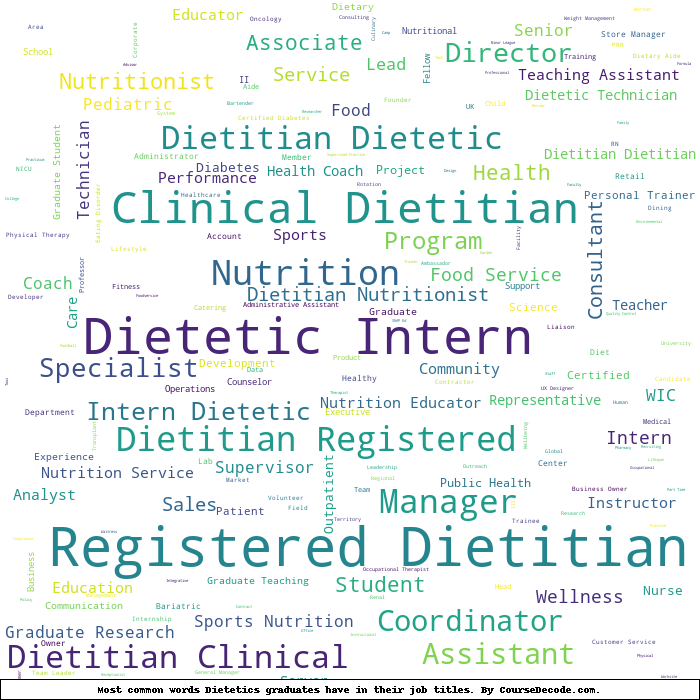
First, some facts. Of the Dietetics graduates from University of Delaware we've analyzed , here's how many have used (or NOT used) their degree in their career:

These are estimates based on AI analysis of 13 LinkedIn profiles (see below).
The verdict? Significantly above average. Overall, with an average relevance score of 87%, Dietetics graduates from University of Delaware have a much higher likelihood (+20%) of finding work in this field compared to the average graduate across all fields:
And for comparison, here's the chart for all profiles we've looked at across all degrees.
Also, after graduating, 61% of these graduates have pursued further education other than another Bachelor's degree (such as a Masters degree or other), compared to the average across all profiles of 35%. This suggests you may need more than just a Bachelors degree to be competitive as a Dietetics graduate.
See the details:
|
Relevance score: 100% We think this person has gone into a career highly relevant to their degree. We think this person has gone into a career highly relevant to their degree.
DEGREE INFOGraduated in 2020 from University of Delaware with a Bachelor of Science - BS in Dietetics. No other secondary education since. JOB HISTORY SINCE GRADUATIONClinical Dietitian ChristianaCare Oct 2021 - Present ABOUTNo information provided. |
The top 10 most common jobs done by the graduates we've analyzed (ranked most common to least) are:
After analyzing the LinkedIn profiles of graduates from the University of Delaware's Dietetics program, it seems like most of them have ended up in positions as Clinical Dietitians, Registered Dietitians, or various roles tied to nutrition management and education. Jobs like Dietetic Internships, Corporate Dietitian roles, and Nutrition Managers show a strong alignment with their educational background in dietetics. Many of these positions involve daily application of their dietetic knowledge and skills, which reflects how well the degree prepares them for professional roles in health and nutrition.
However, there are also a few instances where graduates took on roles less directly related to dietetics. For example, owning a business like Tristen Pickleball or working as a waitress doesn't require the specialized dietetic education they received. While some of these jobs might involve some aspects of nutrition, they don't use the core principles of dietetics that these graduates spent years studying. Overall, though, it’s clear that a significant number of graduates are applying their degree in meaningful ways within the dietetics field, but there's a small subset that ventured into unrelated areas, which is not uncommon for graduates in any field.
Here is a visual representation of the most common words in job titles for Dietetics graduates (this is across all Dietetics graduates we've analyzed, not just those who went to University of Delaware):

Graduates from the Dietetics program at the University of Delaware generally follow a career path that keeps them within the nutrition and dietetics field, and it seems like most of them land relevant jobs fairly quickly after graduation. For their first jobs, many find positions as dietetic interns or entry-level clinical dietitians, which are excellent stepping stones that provide practical experience and lead to further advancement. For instance, several alumni took on roles like clinical dietitians or nutrition managers shortly after completing their internships, demonstrating that they're able to move into fulfilling positions that utilize their education right away.
Five to ten years after graduating, it looks like many of these dietetics graduates are still thriving in the field. A good number have secured roles as registered dietitians, clinical specialists, and even taken on leadership positions such as chief dietitian or education specialist in nutrition programs. There's also a notable trend of some alumni branching out into areas related to dietetics, like nutrition education or health consultancy, showing versatility in their career trajectories. Overall, the career outcomes seem quite positive, indicating that degrees in dietetics from the University of Delaware open doors to solid, rewarding careers in the nutrition space.
Honestly, pursuing a Bachelor’s degree in Dietetics can be pretty challenging, but it really depends on your interests and strengths. At the University of Delaware, you'll dive deep into subjects like nutrition science, biochemistry, and even some psychology, so if you enjoy science and helping people, it might click for you. The workload can be tough, with lab work and projects, but many students find it rewarding because you're learning practical skills that can be applied in real life. So, while it's not a walk in the park, if you’re passionate about food and health, you’ll probably find it more manageable and engaging than some other degrees.
Most commonly, in the LinkedIn profiles we've looked at, it takes people 4 years to finish a Bachelor degree in Dietetics.
From what I can see, it looks like these dietetics graduates from the University of Delaware have had a pretty solid run when it comes to their careers, which usually means they’re making decent money. The earlier graduates in particular have moved into higher-paying roles like Corporate Dietitian and even started their own businesses, like the one involved in pickleball, which is kind of cool and can indicate entrepreneurial success. It seems like they’ve built experience over time, moving up the ladder within companies or even becoming specialists in niche areas like renal dietetics. Sure, entry-level jobs might not pay a ton at first, but as they gain experience, especially with roles in healthcare management and education, their salaries likely improve quite a bit. Overall, it seems they’ve positioned themselves well for a stable and potentially lucrative career path in nutrition.
Here is a visual representation of the most common words seen in the "about" section of LinkedIn profiles who have a Bachelor degree in Dietetics (this is across all Dietetics graduates we've analyzed, not just those who went to University of Delaware). This may or may not be useful:

Here are all colleges offering a Bachelor degree in Dietetics (ordered by the average relevance score of their Dietetics graduates, best to worst) where we have analyzed at least 10 of their graduates:
| College | Score | Count |
|---|---|---|
 University of Delaware University of Delaware
|
87 | 13 |
 Purdue University Purdue University
|
79 | 10 |
 University of Kentucky University of Kentucky
|
76 | 10 |
 Michigan State University Michigan State University
|
74 | 16 |
 Brigham Young University Brigham Young University
|
73 | 12 |
 Iowa State University Iowa State University
|
72 | 13 |
 Florida State University Florida State University
|
67 | 11 |
 Arizona State University Arizona State University
|
65 | 12 |